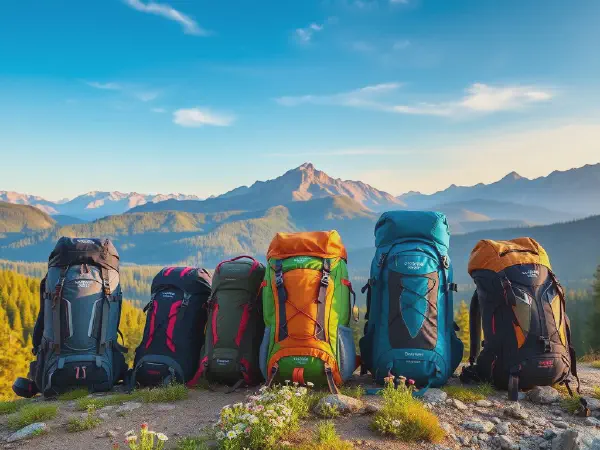Explore the Best: Top Rated Backpacks for Day Hikes Reviews

The Ultimate Guide to Backpacks for Day Hikes
Backpacks for day hikes are essential gear for outdoor enthusiasts looking to explore nature without the burden of heavy loads. These backpacks are designed to comfortably carry all your necessary gear while ensuring you can enjoy the journey. Whether you're a casual walker or a seasoned hiker, choosing the right pack can make all the difference in your hiking experience.
When selecting backpacks for day hikes, it’s critical to consider factors such as weight, comfort, and storage capabilities. The right backpack will not only accommodate your essentials like water, snacks, and a first-aid kit but also maximize your hiking enjoyment by staying comfortable throughout your trek. In this article, we’ll delve deeper into the features, top brands, user experiences, best packing practices, and maintenance tips for day hike backpacks.
One must also factor in the various types available on the market – from small daypacks designed for short excursions to those with added features for longer hikes. Understanding your specific needs, including the types of trails you intend to explore and the season of your hike, will help you choose the most suitable backpack for day hikes.
As outdoor adventure continues to grow in popularity, the equipment market has blossomed. Backpacks for day hikes are no longer just about carrying stuff; they have evolved to offer various features, styles, and technologies that cater to every type of hiker. This article aims to highlight the key aspects you should consider while choosing one and provide insights into the most reputable brands in the market.
In summary, investing in a well-fitting, practical, and stylish backpack is key to enhancing your hiking experience. As we dive into the important features to consider, you’ll be equipped to find a backpack that meets your hiking goals and personal preferences.
Features to Consider in Day Hike Backpacks
Weight and comfort are crucial factors when selecting a day hike backpack. A lightweight pack distributes the load without causing fatigue. Comfort comes from padded shoulder straps, a contoured back panel, and a hip belt that can help alleviate pressure and distribute weight more evenly. Additionally, it's beneficial to test the pack with weight before buying to assess how it feels on your body.
Storage capacity and organization are also key considerations. Day hike backpacks typically range from 15 to 30 liters in volume, suitable for carrying essential gear. Look for compartments and organizational features like separate pockets for hydration reservoirs, smaller items like snacks, and larger sections for extra clothing or gear. This will help you pack efficiently and access your gear with ease during your hike.
Waterproofing and materials play a significant role in the backpack's ability to withstand various weather conditions. A good day hike backpack should be made from durable, water-resistant materials or include a rain cover. These features will keep your gear dry during unexpected rain and ensure longevity in different outdoor environments.
Adjustability and fit are essential for both comfort and stability. Look for models with adjustable straps, sternum straps, and a hip belt that can be customized for a secure fit. A properly fitting backpack helps prevent injuries and keeps the load stable while moving, enhancing your overall hiking experience.
Lastly, consider the accessibility and pocket design. Some backpacks feature side pockets for water bottles, zippered front pockets for quick access to snacks, or top pockets for sunglasses. A practical pocket layout will make a significant difference in organizing and retrieving items while on the trail.
Top Rated Backpack Brands for Day Hikes
One of the top-rated brands for day hike backpacks is Osprey, known for their innovative designs and high-quality materials. Osprey backpacks often feature user-friendly designs aimed at making outdoor adventures as comfortable and enjoyable as possible.
Deuter is another brand that earns high marks for quality and comfort. With a long history in the backpack industry, Deuter backpacks are ergonomically designed, providing optimal comfort during long hikes. Their variety of options caters to hikers of all preferences.
REI Co-op offers fantastic value for money with their line of backpacks that balance quality materials and features at a reasonable price point. They provide a range of styles suitable for various hiking needs, appealing to both casual and serious hikers alike.
Gregory is well-known for its versatile backpack options, offering a wide range of sizes, styles, and colors. Their attention to fit and support ensures a comfortable carry, making them a popular choice for day hikes.
The North Face is synonymous with durability and style. Their backpacks are designed not only to withstand rugged terrain but also to offer modern aesthetics. They combine innovative technology with comfort, making them a favorite among outdoor enthusiasts.
User Reviews and Experiences
When it comes to user feedback on performance, many hikers commend the durability and functionality of their chosen backpacks. Real-life experiences often highlight how well backpacks can handle varying weights and terrain, offering insights into their real-world utility during hikes.
Comfort is a critical factor during long hikes, and user reviews frequently discuss how different backpacks perform in this area. Many hikers share their experiences through comparisons, noting which backpacks excel in providing comfort over extended periods.
Durability ratings after multiple uses are another key talking point in user experiences. Many hikers have reported on how well their backpacks hold up after many trips, providing valuable insights about the longevity and resilience of specific models.
Functionality for various hiking conditions is also a common theme in user feedback. Reviews often delve into how backpacks perform in diverse weather scenarios and terrains, informing potential buyers about the versatility of their options.
Lastly, budget-friendly options frequently receive positive reviews, especially when users find quality backpacks at lower price tags. Hikers often emphasize the importance of obtaining value for their investment while still getting quality features.
Best Practices for Packing a Day Hike Backpack
To distribute weight evenly in your backpack, place heavier items closer to your back and higher up in the pack. This helps maintain your center of gravity and reduces strain on your back during your hike. Additionally, keeping lightweight items at the bottom and in external pockets can enhance balance.
For safety, packing essential items like a first-aid kit, flashlight, multi-tool, and snacks is crucial. Always ensure these essentials are easily accessible, so you can quickly reach for them if needed during your hike.
Optimizing space with packing techniques can help you fit more items into your backpack. Use packing cubes or stuff sacks to compartmentalize gear, and roll clothing instead of folding it to save space. This maximizes your pack's capacity without adding unnecessary bulk.
Using hydration systems efficiently is vital for staying hydrated on the trail. Consider a hydration reservoir instead of traditional water bottles for easier access to water, particularly during hot hikes where frequent hydration is essential.
Adjusting your pack for different terrains is important for maintaining comfort and stability. For steep or uneven terrain, tighten your hip belt and adjust the shoulder straps for a snug fit that holds the backpack closer to your body, enhancing balance and control.
Maintenance and Care for Hiking Backpacks
Cleaning your backpack properly after your hiking trips is essential for maintaining its integrity. Use a gentle soap and water solution, rinsing thoroughly, and avoid placing it in a washing machine unless it's specifically recommended by the manufacturer.
Repairing minor damages can extend the life of your backpack. If you notice small tears or frayed straps, patch them up with specialized repair kits designed for outdoor gear. This proactive maintenance can save you from needing costly replacements.
Storing your backpack properly is important for its longevity. Keep it in a cool, dry place away from direct sunlight, and consider inflating it when storing to preserve its shape and prevent creasing or deformation.
Waterproofing solutions can protect your gear from moisture damage. Apply a water-repellent spray specifically designed for fabrics, or use a rain cover during wet conditions to ensure your belongings stay dry during outdoor adventures.
Lastly, regularly check zippers and straps for wear and tear. This proactive approach will help you identify any potential issues before they become significant problems and ensure your backpack remains functional for every hike.
